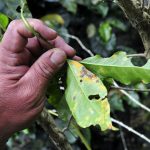The food price crisis of 2007–2008 threatened global food security. The access of households to quality and nutritious food was especially at risk due to their diminished purchasing power. In an effort to assist the United Nations (UN) Secretary-General and the UN High-Level Task Force (HLTF) on the Global Food Security Crisis, GIZ supported IFPRI in delivering relevant information and cutting-edge analyses on food and nutrition policy actions.
Innovation in Insurance: Managing the Risky Business of Weather
On March 29-30, 2017, the Chicago Council on Global Affairs will host the Global Food Security Symposium in Washington, D.C. IFPRI has been helping design and evaluate index insurance products to aid farmers in mitigating the impact and managing the risks associated with severe weather and crop loss.
Innovations for Stimulating Improved Water Management
World Water Day will be celebrated on March 22. IFPRI has been using experimental games on the ground to measure collective action and test theories about behaviors regarding common pool resources.
The Global Hunger Index
To rank countries and illustrate trends in hunger worldwide, IFPRI, Concern Worldwide, and Welthungerhilfe developed the Global Hunger Index (GHI), which captures four indicators of hunger: undernourishment, child wasting, child stunting, and child mortality. Using data from the Food and Agriculture Organization of the United Nations (FAO), the World Health Organization (WHO), and UNICEF, the index ranks countries on a 100-point scale, with 0 being the best score (no hunger) and 100 being the worst. The GHI is updated annually to track progress. By highlighting this information, the index serves as a tool for mobilizing political will and promoting effective policies to combat hunger. For more than a decade, the GHI has helped to increase country accountability in order to reduce hunger and undernutrition.
Strengthening Resilience in Latin America
Climate change and agricultural diseases threaten the food security and livelihoods of many poor people in developing countries. IFPRI’s research in Latin America examined these environmental shocks, helping to bring the urgency of adaptation and mitigation to the forefront and to convince policy makers to act to build the poor’s resilience. In the 2000s, little >> Read more
Enhancing South-South Learning: From Brazil to Africa
Brazil has made impressive progress in reducing poverty. Rural poverty has been cut almost in half, from 51 percent in 2002 to 29 percent in 2011, and family farmers’ incomes grew by 50 percent. These results were achieved partially through Fomento, a set of government-run social programs targeting smallholder farmers. When a program shows such >> Read more
- « Previous Page
- 1
- 2
- 3
- 4
- …
- 17
- Next Page »





